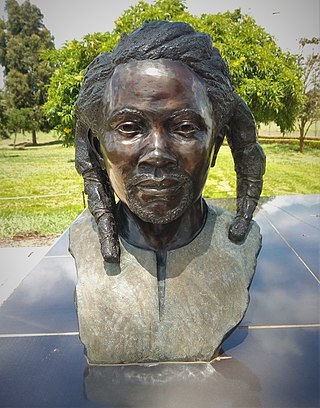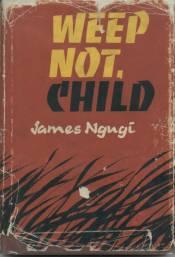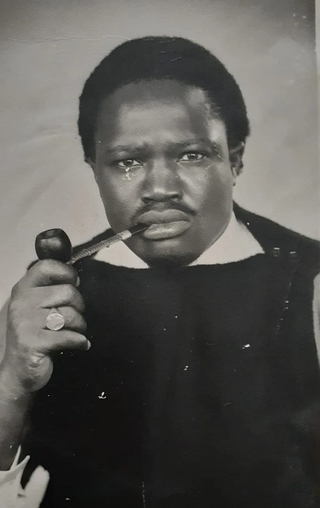
A part of Eastern Africa, the territory of what is known as Kenya has seen human habitation since the beginning of the Lower Paleolithic. The Bantu expansion from a West African centre of dispersal reached the area by the 1st millennium AD. With the borders of the modern state at the crossroads of the Bantu, Nilo-Saharan and Afro-Asiatic ethno-linguistic areas of Africa, Kenya is a multi-ethnic state. The Wanga Kingdom was formally established in the late 17th century. The Kingdom covered from the Jinja in Uganda to Naivasha in the East of Kenya. This is the first time the Wanga people and Luhya tribe were united and led by a centralized leader, a king, known as the Nabongo.

The Mau Mau rebellion (1952–1960), also known as the Mau Mau uprising, Mau Mau revolt, or Kenya Emergency, was a war in the British Kenya Colony (1920–1963) between the Kenya Land and Freedom Army (KLFA), also known as the Mau Mau, and the British authorities. Dominated by Kikuyu, Meru and Embu fighters, the KLFA also comprised units of Kamba and Maasai who fought against the European colonists in Kenya - the British Army, and the local Kenya Regiment.

Jomo Kenyatta was a Kenyan anti-colonial activist and politician who governed Kenya as its Prime Minister from 1963 to 1964 and then as its first President from 1964 to his death in 1978. He played a significant role in the transformation of Kenya from a colony of the British Empire into an independent republic. Ideologically an African nationalist and a conservative, he led the Kenya African National Union (KANU) party from 1961 until his death.

The Kikuyu are a Bantu ethnic group native to East Africa Central Kenya. At a population of 8,148,668 as of 2019, they account for 17.13% of the total population of Kenya, making them Kenya's largest ethnic group.

The flag of Kenya is a tricolour of black, red, and green with two white edges imposed with a red, white and black Maasai shield and two crossed spears. The flag is mainly based on that of Kenya African National Union and was officially adopted on 12 December 1963 after Kenya's independence.

Dedan Kimathi Waciuri was the leader of the Kenya Land and Freedom Army during the Mau Mau Uprising (1952–1960) against the British colonial rule in Kenya in the 1950s. He was captured by the British in 1956 and executed in 1957. Kenya gained independence in 1963. Kimathi is credited with leading efforts to create formal military structures within the Mau Mau, and convening a war council in 1953. He, along with Baimungi M'marete, Musa Mwariama, Kubu Kubu, General China and Muthoni Kirima, was one of the Field Marshals.

The Kenya African Union (KAU) was a political organization in colonial Kenya, formed in October 1944 prior to the appointment of the first African to sit in the Legislative Council. In 1960 it became the current Kenya African National Union (KANU).

Thomas Joseph Odhiambo Mboya was a Kenyan trade unionist, educator, Pan-Africanist, author, independence activist, and statesman. He was one of the founding fathers of the Republic of Kenya. He led the negotiations for independence at the Lancaster House Conferences and was instrumental in the formation of Kenya's independence party – the Kenya African National Union (KANU) – where he served as its first Secretary-General. He laid the foundation for Kenya's capitalist and mixed economy policies at the height of the Cold War and set up several of the country's key labour institutions. Mboya was Minister for Economic Planning and Development when he was assassinated.

Josiah Mwangi Kariuki, popularly referred to as 'JM', was a Kenyan socialist politician during the administration of Jomo Kenyatta's government. He held different government positions from Kenya's independence in 1963 until his assassination in 1975.

The Luo of Kenya and Tanzania are a Nilotic ethnic group native to western Kenya and the Mara Region of northern Tanzania in East Africa. The Luo are the fourth-largest ethnic group (10.65%) in Kenya, after the Kikuyu (17.13%), the Luhya (14.35%) and the Kalenjin (13.37%). The Tanzanian Luo population was estimated at 1.1 million in 2001 and 3.4 million in 2020. They are part of a larger group of related Luo peoples who inhabit an area ranging from South Sudan, southwestern Ethiopia, northern and eastern Uganda, southwestern Kenya, and northern Tanzania, making them one of the largest ethnic groups in East Africa.
The 1959 Hola massacre was a massacre committed by British colonial forces during the Mau Mau Uprising at a colonial detention camp in Hola, Kenya.

White people in Kenya or White Kenyans are those born in or resident in Kenya who descend from Europeans and/or identify themselves as White. There is currently a minor but relatively prominent White community in Kenya, mainly descended from British, but also to a lesser extent Italian and Greek, migrants dating from the colonial period.

Weep Not, Child is a 1964 novel by Kenyan author Ngũgĩ wa Thiong'o. It was his first novel, published in 1964 under the name James Ngugi. It was in the African Writers Series of the Heinemann publishing company. Weep Not, Child was the first English-language novel by an East African to be published. Thiong'o's works deal with the relationship between Africans and white settlers in colonial Kenya, and are heavily critical of colonial rule. Specifically, Weep Not, Child deals with the Mau Mau Uprising, and "the bewildering dispossession of an entire people from their ancestral land." Ngũgĩ wrote the novel while he was a student at Makerere University.
The Kapenguria Six – Bildad Kaggia, Kung'u Karumba, Jomo Kenyatta, Fred Kubai, Paul Ngei, and Achieng' Oneko – were six leading Kenyan nationalists who were arrested in 1952, tried at Kapenguria in 1952–53, and imprisoned thereafter in Northern Kenya.
David Richard Koff was an American maker of documentary films, social activist, writer, researcher, and editor. His interest in social and economic justice has shaped a career largely spent exploring human rights, colonialism, resistance movements, racism, labor unions, and the oppression and exploitation of undocumented workers in America. However, he veered from political concerns long enough to write and co-produce the film People of the Wind, for which, in 1976, he was nominated for an Academy Award for Best Feature Documentary.

The Colony and Protectorate of Kenya, commonly known as British Kenya or British East Africa, was part of the British Empire in Africa from 1920 until 1963. It was established when the former East Africa Protectorate was transformed into a British Crown colony in 1920. Technically, the "Colony of Kenya" referred to the interior lands, while a 16 km (10 mi) coastal strip, nominally on lease from the Sultan of Zanzibar, was the "Protectorate of Kenya", but the two were controlled as a single administrative unit. The colony came to an end in 1963 when a native Kenyan majority government was elected for the first time and eventually declared independence.
The Kenya Land and Freedom Army (KLFA), also known as the Mau Mau, was a Kenyan insurgent group which fought against British colonial rule in Kenya during the Mau Mau rebellion from 1952 to 1960. Its membership consisted largely of the Kikuyu people. The KLFA was led by Dedan Kimathi for most of its existence. After four years, British forces managed to destroy the KFLA militarily, and Kimathi was captured and executed in 1957. Though the Mau Mau rebellion was ultimately suppressed, it played a major role in achieving Kenya's independence, which occurred in 1963.

The presidency of Jomo Kenyatta began on 12 December 1964, when Jomo Kenyatta was named as the 1st president of Kenya, and ended on 22 August 1978 upon his death. Jomo Kenyatta, a KANU member, took office following the formation of the republic of Kenya after independence following his efforts during the fight for Independence. Four years later, in the 1969 elections, he was the sole candidate and was elected unopposed for a second term in office. In 1974, he was re-elected for a third term. Although the post of President of Kenya was due to be elected at the same time as the National Assembly, Jomo Kenyatta was the sole candidate and was automatically elected without a vote being held. He died on 22 August 1978 while still in office and was succeeded by Daniel arap Moi.

Ochola Ogaye Mak'Anyengo, also known as George Philip Ochola (1930–1990) was a Kenyan trade unionist and Member of Parliament for Ndhiwa, South Nyanza, Kenya. He was involved in the fight for Kenya's independence and was a beneficiary of the Mboya-Kennedy airlifts.

During the colonial occupation of Kenya, Black Africans working on farms owned by white settlers were called "squatters" by the British. As of 1945, there were over 200,000 such squatters in the Highlands and more than half were Kikuyu. The Mau Mau rebellion began amongst these squatters in the late 1940s and after independence in the early 1960s, peasants started squatting land in rural areas without the permission of the owner.













